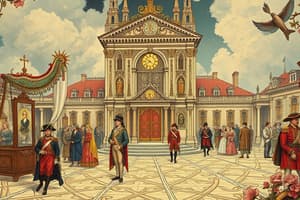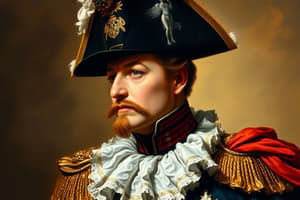Podcast
Questions and Answers
What was a significant result of mercantilism on the Spanish economy during the early phases of exploration?
What was a significant result of mercantilism on the Spanish economy during the early phases of exploration?
- It caused Spain to rely solely on agricultural exports.
- It initially strengthened the economy before contributing to inflation. (correct)
- It significantly decreased trade with their colonies.
- It led to the immediate downfall of the Spanish monarchy.
What were the primary reasons for the shift in trade from the Mediterranean to the Atlantic states?
What were the primary reasons for the shift in trade from the Mediterranean to the Atlantic states?
- A reduction in the European population leading to decreased trade.
- The decline of maritime technologies in Mediterranean ports.
- The discovery of new trade routes to the Americas and the demand for new goods. (correct)
- Increased agricultural production in the Mediterranean region.
How did the Protestant Reformation impact the role of the printing press?
How did the Protestant Reformation impact the role of the printing press?
- It led to the decline of literacy among the general populace.
- It allowed for the rapid dissemination of reformist ideas across Europe. (correct)
- It solely focused on the prints of Catholic doctrine.
- It diminished the importance of the printing press in religious discourse.
What was one approach taken by Spain in dealing with Protestant movements?
What was one approach taken by Spain in dealing with Protestant movements?
What was one of the outcomes of the Council of Trent?
What was one of the outcomes of the Council of Trent?
What was the primary purpose of the women's march to Versailles?
What was the primary purpose of the women's march to Versailles?
What issue arose from the Civil Constitution of the Clergy during the French Revolution?
What issue arose from the Civil Constitution of the Clergy during the French Revolution?
What concept did Abbe Sieyes promote in his text 'What is the Third Estate'?
What concept did Abbe Sieyes promote in his text 'What is the Third Estate'?
What was the purpose of the levee en masse issued by the National Convention?
What was the purpose of the levee en masse issued by the National Convention?
What was the effect of Napoleon's loss at the Battle of Trafalgar on his naval strategy?
What was the effect of Napoleon's loss at the Battle of Trafalgar on his naval strategy?
What did Beccaria advocate for regarding the justice system?
What did Beccaria advocate for regarding the justice system?
How did the Scientific Revolution influence the Enlightenment?
How did the Scientific Revolution influence the Enlightenment?
Which idea did Voltaire advocate in the 18th century?
Which idea did Voltaire advocate in the 18th century?
Flashcards
Women's march to Versailles
Women's march to Versailles
The march of women from Paris to Versailles (October 1789) demanded King Louis XVI return to Paris and addressed their concerns about the high price of bread. The event symbolizes the women's role in the Revolution and their desperate need for food.
Noble privileges abolished
Noble privileges abolished
The privileges held by the nobility, such as exemption from taxes, were abolished by the National Assembly during the French Revolution. This marked a significant shift towards equality and a more democratic society.
What is the Third Estate?
What is the Third Estate?
Abbe Sieyes, a prominent French clergyman, argued that the Third Estate (commoners) constituted the true nation and should have the most power in government. This idea played a crucial role in the Revolution's call for greater representation.
Civil Constitution of the Clergy
Civil Constitution of the Clergy
Signup and view all the flashcards
Mercantilism
Mercantilism
Signup and view all the flashcards
Early acceptance of women's rights
Early acceptance of women's rights
Signup and view all the flashcards
Levee en masse
Levee en masse
Signup and view all the flashcards
Plantation System
Plantation System
Signup and view all the flashcards
Napoleon's military victories
Napoleon's military victories
Signup and view all the flashcards
Trade shift from Mediterranean to Atlantic
Trade shift from Mediterranean to Atlantic
Signup and view all the flashcards
Protestant Reformation Emphasis on Bible Study
Protestant Reformation Emphasis on Bible Study
Signup and view all the flashcards
Napoleon's constitutional government
Napoleon's constitutional government
Signup and view all the flashcards
Counter-Reformation
Counter-Reformation
Signup and view all the flashcards
Study Notes
French Revolution and Napoleon
- Women's march to Versailles: Aimed to address bread shortages and royal indifference.
- Noble privilege: Eliminated permanently during the revolution.
- Abbe Sieyes's "What is the Third Estate?": Advocated for the rights of the commoners.
- Civil Constitution of the Clergy: Attempting to subordinate the clergy to the state, this created conflict.
- Women's rights in the early Revolution: Limited support, with some advocating for equality.
- Levee en masse: Mass conscription of citizens for war effort by the National Convention.
- Napoleon's military victories: Widespread successes across Europe.
- Napoleon's government: Limited freedoms of speech and press.
- Continental System: Economic blockade against Great Britain.
- Battle of Trafalgar and Napoleon's navy: Defeat severely harmed naval capabilities.
- Spread of liberal ideals: French invasions influenced political thought in Europe.
- Mass conscription (draft): All European powers adopted conscription to match France's army.
Scientific Revolution
- Scientific discoveries' impact: Widespread impact on European societies, gradually.
- Dissection and integrated systems: Harvey and Vesalius used dissection to reveal body systems.
- Scientific empiricism: Widely accepted by the 19th century.
- Francis Bacon and empiricism: Key figure in promoting scientific method.
- Inductive reasoning and empiricism: Galileo and Newton exemplified through observations and experiments.
- Deductive reasoning and mathematics: Descartes used logic and math principles to enhance scientific methodology.
- Universe's operation (Newton): Explained by universal laws of motion and gravity.
- Influence on the Enlightenment: Scientific Revolution provided a foundation for Enlightenment thought.
Enlightenment
- Scientific empiricism's use: A cornerstone of Enlightenment thought.
- Traveler's accounts' effect on philosophes: Inspired curiosity and questioning of existing societal norms.
- Philosophes' knowledge acquisition: Through observation, reason, and critical thinking.
- Religious toleration: Viewed as essential by Enlightenment thinkers.
- Voltaire's criticisms: Challenged religious and secular leaders' inflexible positions.
- Voltaire's support for enlightened absolutism: Believed in a strong ruler guided by reason.
- Beccaria's beliefs: Advocated for just and humane legal reforms.
Absolutism
- Peter the Great's Western European visit: Aimed to modernize Russia.
- Habsburgs' territories (early 17th century): Extent of their control in Europe.
- Philip II's motives in the Dutch Revolt: Religious and political dominance.
Golden Age of the Dutch
- Middle class wealth and investment: Increased power and influence during the Golden Age.
- Joint-stock companies: Significant factor in Dutch economic success.
- Speculation: Part of the economic boom.
Thirty Years War
- Effects on Spain: Negative impact.
- Effects on the Holy Roman Empire: Devastating consequences.
Exploration and Colonization
- Shift from Mediterranean to Atlantic: Driven by trade routes and exploration.
- Cortes' conquest of Mexico: Spanish conquest.
- Mercantilism: Economic system emphasizing exports and state control.
- Plantation system: Economic structure relying on agricultural production and enslaved labor.
- Mercantilism's effect on Spanish economy: Initial strength followed by potential inflation (Price Revolution).
- Portugal's trading losses: Reasons are not listed
- African slave trade motives: To provide labor for plantations.
Protestant Reformation, Counter-Reformation, Spanish Inquisition
- Reformers' emphasis: Study of the Bible.
- Printing press and Protestantism: Facilitated widespread dissemination of religious ideas.
- Spain's treatment of Protestants: Suppression.
- Council of Trent: Catholic response to the Reformation.
- Religious unity: Prioritized by European monarchs to enhance their power.
Renaissance
- Erasmus and Christian humanism: Example of humanist thought integrating religious beliefs.
- Secularism and Christian Humanism: Differences existed between these forms of humanism.
Studying That Suits You
Use AI to generate personalized quizzes and flashcards to suit your learning preferences.




